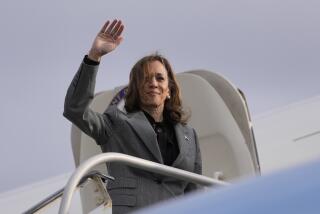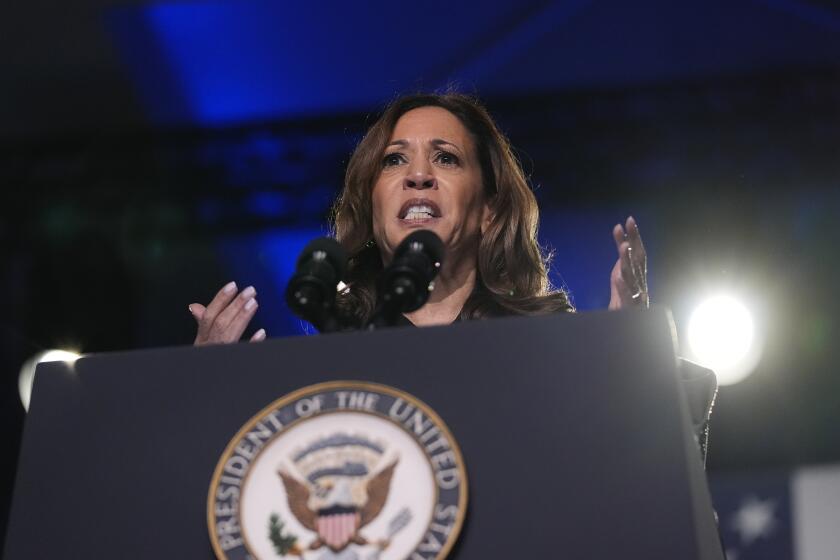Campaigns Rush to Apply Post-Debate Spin
The Republican and Democratic parties today put their best spin on Thursday’s debate between President Bush and Senator John F. Kerry, perceiving the showdown as starkly different as the candidates’ views over Iraq.
The Democratic National Committee rushed onto its website today a 51-second video clip that showed footage from the debate with Bush and Kerry in split screen.
Called “Faces of Frustration,” the video was edited to show Bush’s grimacing, head-shaking and exasperation as Kerry was making points. The Democratic website also declared flatly: “The National Verdict Is In: John Kerry Wins First Debate.”
By contrast, the Republican National Committee had posted no visual images from the debate on its website by early afternoon, or claims that Bush had “won” the debate. That was a telling sign of the internal GOP assessment because the party generally is quick to post official responses to live news events.
The only post-debate item immediately apparent on the home page was a link to an audio recording of portions of the debate. But Republicans were assembling a video that was expected to show footage of Kerry in the debate and cite his past statements on Iraq in an effort to portray the Democrat as indecisive.
While Bush’s campaign website was filled with criticism of Kerry’s performance, there was nothing immediately apparent on the home page that suggested the president’s camp was claiming victory. Kerry’s website, on the other hand, claimed “a decisive victory” for the Democrat at the top of the page.
The two men entered their debate Thursday determined to cast their differences on the debate’s chosen topic — foreign policy and national defense — in the starkest, most dramatic way possible.
Bush sought to overcome voters’ doubts about the war in Iraq and his hard-nosed approach to foreign policy by framing the November vote as a referendum on leadership. “I wake up every day thinking about how best to protect America. That’s my job,” Bush said.
“You’d better have a president who chases these terrorists down and brings them to justice before they hurt us again,” he added, peering sternly into the TV cameras and pounding his hand on the lectern for emphasis.
He also said, “The best way to protect our homeland is to stay on the offensive.”
Kerry sought to turn Bush’s decisiveness against him by portraying the president as bullheaded and reckless in refusing to adjust his course, even when events change. “It’s one thing to be certain,” Kerry said. “But you can be certain and wrong.”
In a conference call today with reporters, Kerry strategists claimed the Democrat won a decisive victory in the debate but predicted weeks of bare-knuckled campaigning to come.
“It was obviously a very strong performance by John Kerry. He clearly won the debate,” said Kerry advisor Joe Lockhart. “It was an uneven performance for President Bush.”
Lockhart said the lasting image from the TV appearance would be “the smirk from President Bush. He seemed agitated, annoyed, fidgety.”
Aides for both parties made frequent appearances on morning news shows today, hoping to further shape viewers’ opinions on a race that, according to polls, remains fluid.
Many analysts today dwelled on how Bush and Kerry looked Thursday night when their faces were shown on split screen during the debate. There was an emerging sense that Kerry profited from this visual comparison.
“Because of Kerry’s height within the frame, his picture was necessarily bigger,” said Fox News Channel anchor Brit Hume.
Of Kerry, Hume added: “He looked taller, and the president looked smaller. That’s something that I think both sides were conscious of. I’m not sure it was something anybody planned but it worked out that way.”
Bush and Kerry clashed sharply Thursday night over the war in Iraq, with Bush declaring the U.S. invasion a vital step in the fight against terrorists and Kerry depicting the conflict as a costly diversion from more serious threats.
Bush repeatedly used Kerry’s words and actions against him. He portrayed his Democratic rival as too weak and vacillating to run the country at a time when the prospect of a terrorist attack had become a color-coded part of everyday living.
“The only thing consistent about my opponent’s position is that he’s been inconsistent,” Bush said of Kerry’s stance on Iraq. “He changes positions. And you cannot change positions in this war on terror if you expect to win. And I expect to win. It’s necessary we win.”
Kerry, standing across from the president on a theater stage at the University of Miami, said his position on the war had been unwavering: He viewed Iraqi leader Saddam Hussein as a threat and favored disarming his regime, but not the way Bush approached the task. He also accused the president of making “a colossal error of judgment” by focusing on Iraq at the expense of fighting Al Qaeda terrorists.
“Saddam Hussein didn’t attack us,” Kerry said in reference to the Sept. 11, 2001, terrorist strikes. “Osama bin Laden attacked us. Al Qaeda attacked us.”
Later in the debate, Bush responded somewhat testily, “Of course I know Osama bin Laden attacked us. I know that.”
Kerry dismissed Bush’s assertion that Iraq was at the center of the worldwide fight against terrorism. “Iraq was not even close to the center of the war on terror before the president invaded it,” Kerry said.
He vowed to hasten the withdrawal of U.S. troops from Iraq and speed its reconstruction by drawing the nation’s estranged allies together at an international summit he would convene as president. “We can do better,” Kerry promised over and over throughout the 90-minute session.
Bush accused Kerry of disparaging the contributions of allies such as Great Britain and Poland, and said that minimizing their to role in the war effort was not the way to rally further international support.
Citing Kerry’s recent depiction of the invasion of Iraq as “the wrong war in the wrong place at the wrong time,” Bush said such comments not only demoralized U.S. troops but gave other countries reason to question Kerry’s conviction. “You can’t expect to build an alliance when you denigrate the contributions of those who are serving side-by-side with American troops in Iraq,” Bush said.
To drive home his point, he used the words “mixed message” or “mixed signals” half a dozen times to characterize Kerry’s position on Iraq.
Seeking to counter that assertion, Kerry said, “I have no intention of wilting. I’ve never wilted in my life, and I’ve never wavered in my life.”
Times staff writer Daryl Strickland contributed to this report.
More to Read
Get the L.A. Times Politics newsletter
Deeply reported insights into legislation, politics and policy from Sacramento, Washington and beyond. In your inbox three times per week.
You may occasionally receive promotional content from the Los Angeles Times.












